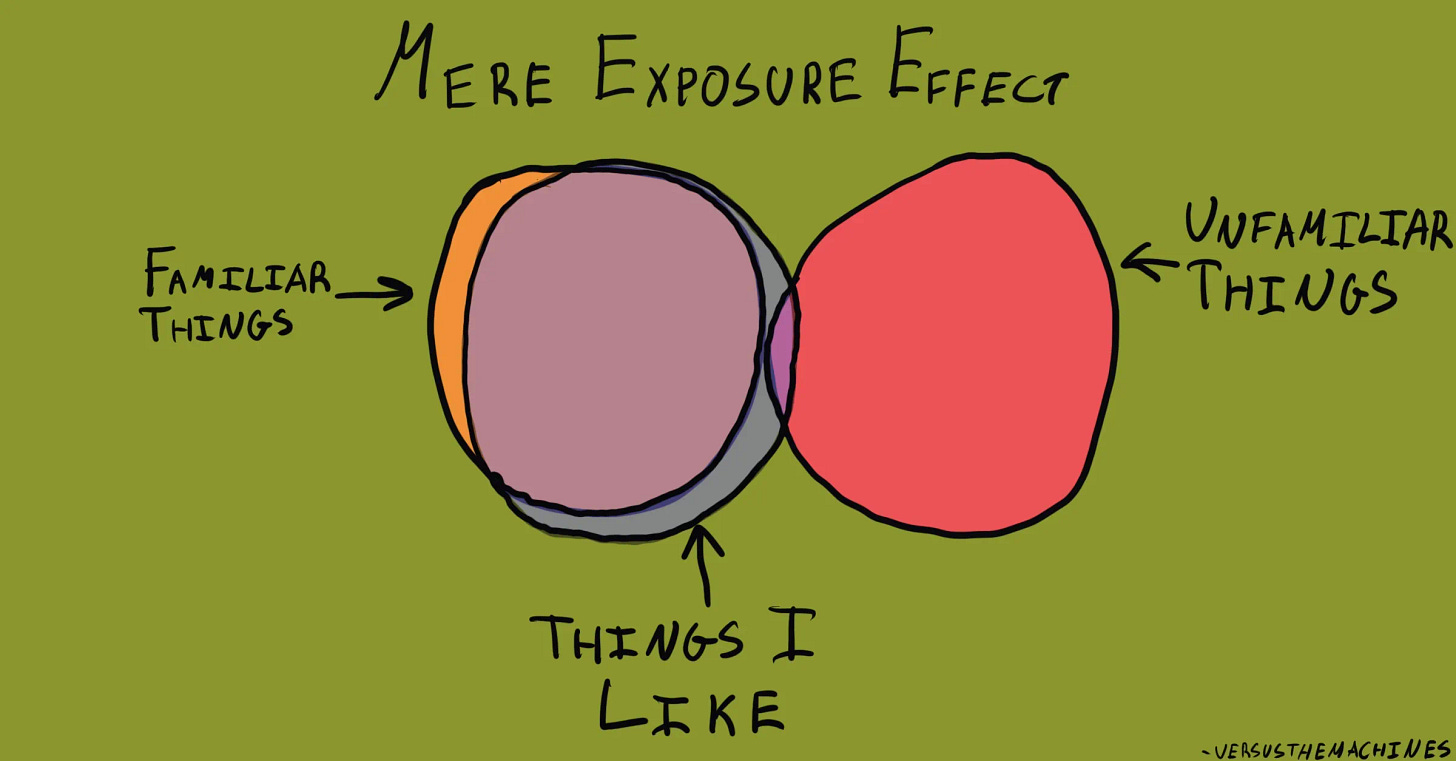I’ve never been to Boston. Or Philadelphia. Or Baltimore. Or Charlotte. Or Miami. Or (you get the point)…
But I’ve been on vacation to New York City a half dozen times or more.
Why?
There is the old saying that “familiarity breeds contempt,” the idea that we crave novel concepts and get bored with the same old thing. That may be true in one sense - the same dinner every night might not create the same stimulus as a new and novel dinner each night. And I suppose that could work with jobs or partners or any number of things.
Psychological research would suggest, however, that “familiarity breeds preferences.” This would put forth that we like what is familiar and avoid what is unfamiliar. So, essentially, as New York becomes more familiar, we prefer it more to the places that remain unfamiliar.
Coined by Robert Zajonc in the 1960s, this is called the Mere Exposure Effect. Basically stated, the more you’re around a place or person, the more comfortable you are or likable they become.
Consider comfort food. Depending on your family of origin or region of birth, comfort food might be very different for you and another person. One person’s pot roast is another person’s kimchi.
Why do I like fried okra? I grew up with it. It’s familiar.
Think about sushi. There was a time when sushi was “weird” and getting a friend to try it for the first time was like trying to convince them to eat an earthworm straight from the ground. Now sushi is ubiquitous and no one thinks much of it. Even my extremely midwestern kids know which mediocre grocery-store sushi they prefer. If I invite them to try a different variety, they shrug and give it a shot.
Which is why, perhaps, we keep going to NYC for vacation. It’s familiar. We know how to get around using the subway. We have favorite restaurants. We know which particular shops we like to visit at the pop-up Bryant Park Christmas Market (pictured above).
But Boston? Where do we stay? What do we eat? How does their subway system work? Nah, let’s stick with what we know.
It wouldn’t be hard to connect this line of thinking to confirmation bias, political polarization, or other modern phenomena that seem to be exponentially increasing in the age of the algorithmic existence.
For me, however, as a pastor, this is primarily concerning as I consider guests at our church.
If we’re all drawn to what is familiar, imagine the plight of a new person in a new space amongst hundreds of people who all seem to know each other already. It isn’t hard to begin to empathize with what can be a profoundly isolating experience.
I don’t feel like I can fit in because everyone is unfamiliar. But because everyone is unfamiliar I don’t feel like I can fit in.
So what can be done? Well, the long term members and attenders (insiders) have to overcome the Mere Exposure Effect.
At the most basic level, this problem is solved when “insiders” make intentional efforts to connect with “outsiders.” So the guests go from unknown and unfamiliar to quickly having a face and name to connect with each week.
Here’s the key ➡️ this requires the “insider” - a church member or regular attender - to override their innate preference for what is familiar. While they see a friend two rows over or have a funny anecdote to share with someone in their community group, they have to, instead, choose to walk past that preferred face and engage the unfamiliar guest. In this way, the “outsider” is invited into the circle of familiarity. And as further connections are made and they move towards the center of the inside group, they feel safer and more known. It’s a virtuous cycle that self-reinforces intimacy and relational security.
This isn’t some smarmy church growth strategy either. It’s a reflection of what Jesus did time after time. He met outcasts and outsiders, the overlooked and unfamiliar. And he invited them into a new kind of insider status, one that was unearned and beautifully upside-down.
The Mere Exposure Effect has to be overcome to invite the outsider in but, once inside, the effect begins to do the work of further bonding them in familiar safety.
As the holidays approach, it’s something for all of us to consider.
Last December, our family did the things we love to do in NYC. We drank Blue Bottle coffee, ate peanut butter and jelly deliciousness at Doughnut Plant, and sank into perfect pizza at Angelos. We went to the ballet and a Knicks game. We skated in Central Park and exhaustedly dozed off on the subway. Maybe most familiar and comforting, we bundled up and strolled the Bryant Park Christmas Market. We laughed and drank hot chocolate, and marveled at the sparkling beauty of a familiar place in a magical season.
This year, someone is going to bring their new girlfriend or spouse to family Thanksgiving or Christmas celebration. And that person will be the outsider, the unfamiliar other at the party. Perhaps this is the year where we can all knowingly overcome the Mere Exposure Effect. In our own little way, we can each help make an outsider feel like an insider. We can enfold them, include them in our bundled up memory-making and our family familiarity. If we do it right, we’ll lovingly move someone from an isolating, anxiety-inducing space into the warm and comforting circle of Christ-like love.
- KB





